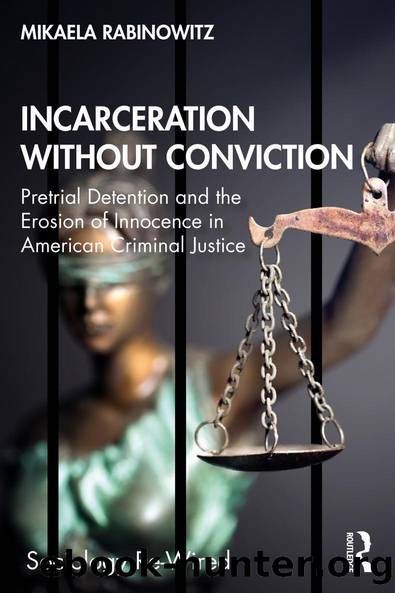Incarceration without Conviction by Mikaela Rabinowitz

Author:Mikaela Rabinowitz [Rabinowitz, Mikaela]
Language: eng
Format: epub
ISBN: 9781000391473
Barnesnoble:
Publisher: Taylor & Francis
Published: 2021-07-14T00:00:00+00:00
Presumption of Innocence
Unsurprisingly, neither Calvin nor Aaron perceived a presumption of innocence during the course of his detention. Similar to the individuals discussed in Chapter 2, both Calvin and Aaron noted that they were treated as if guilty from the moment they were arrested. As Aaron recalled, despite knowing that he had done nothing wrong, the way he was treated at the point of arrest convinced him that he would be found guilty. âIt was like, the officers, as I was being arrested, one of the officers was telling me what the charges was, how much time that it carries. Iâm like man, thatâs where Iâm going to be.â Calvin concurred: âI guess as soon as you get arrested all of your rights are gone out the door.â Bringing up a similar point later in our interview, Calvin again pointed to the experience of the criminal justice system and the actions of the criminal justice system actors as demonstrating their presumption of his guilt: âJust being in the County [jail], the way they treat you like you already convicted. Like they already got your clothes ready for you to go down [to the penitentiary].â
Similar to the individuals in Chapter 2 who ultimately did plead guilty, for the individuals discussed in this chapterâboth legally and factually innocentâit is a cumulative series of encounters with criminal justice processes that cements the realization that they are presumed guilty. Notwithstanding the Supreme Courtâs determination of the presumption of innocence as a procedural directive regarding the treatment of defendants at trial, their experiences and those of other individuals who are never convicted belie this axiom as it is more colloquially understood. Moreover, the fact that the vast majority of defendants never go to trial underscores the disjuncture between the Supreme Courtâs interpretation of the presumption of innocence and defendantsâ experience thereof. As discussed below, the experiences of individuals charged with two types of crimes particularly exemplify this contradiction: drug possession and domestic violence.
Download
This site does not store any files on its server. We only index and link to content provided by other sites. Please contact the content providers to delete copyright contents if any and email us, we'll remove relevant links or contents immediately.
Constitutional Law by Erwin Chemerinsky;(174)
Solve Your Money Troubles by Amy Loftsgordon;Cara O'Neill;(168)
European Witch Trials (RLE Witchcraft) by Richard Kieckhefer(167)
Sentencing and Artificial Intelligence by Ryberg Jesper;Roberts Julian V.;(164)
Roman Law and Economics by unknow(155)
Dictionary of American Criminal Justice by Dean J. Champion(153)
Juvenile Risk and Needs Assessment by Christopher J. Sullivan Kristina K. Childs(142)
Policing the Police : Knowledge Management in Law Enforcement by Petter Gottschalk(142)
A Constitution for the Living by Beau Breslin(141)
Zionism, Palestinian Nationalism and the Law: 1939-1948 by Steven E Zipperstein(137)
The Supreme Court's Role in Mass Incarceration by William T. Pizzi(135)
Incarceration without Conviction by Mikaela Rabinowitz(134)
Lawyers, Lead On by Williford Rebecca S.;Basas Carrie A.;Enyart Stephanie L.;(132)
Law for Student Police Officers by Merritt Jonathan;(131)
Crime and the Life Course by Michael L. Benson(130)
The Eternal Criminal Record by James B. Jacobs(129)
The Legal Guide for Museum Professionals by Courtney Julia;(129)
Juvenile Homicides : A Social Disorganization Perspective by Minna K. Laurikkala(123)
Revitalizing Victimization Theory by Travis C. Pratt Jillian J. Turanovic(122)
